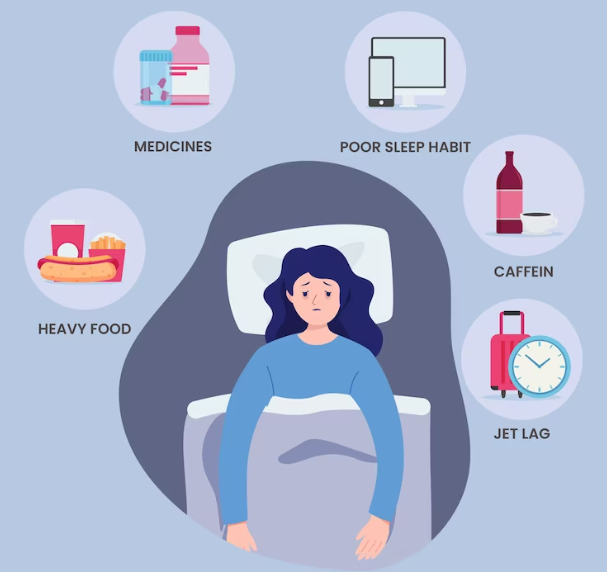When you have sleep apnea, you stop breathing while you’re asleep. Your brain tries to protect you by waking you awake enough to breathe, but this inhibits restful, good sleep. This issue can develop into major consequences over time. However, this illness is frequently quite controllable, especially when prescribed therapies are strictly followed.
What is Sleep Apnea?
When you have sleep apnea, your breathing stops while you are asleep. You stop breathing while you’re sleeping, which causes sleep apnea. Obstructive sleep apnea (OSA) or central apnea (CASA) are the two conditions that induce these episodes of breathing interruptions during sleep. The consequent lack of oxygen triggers a survival reaction that briefly awakens you so you may start breathing again. That prevents you from getting enough rest to fall asleep and may have other consequences, such as stressing out your heart, which may have fatal results.
What Causes Sleep Apnea?
The majority of the time, sleep apnea has particular causes, and there is evidence that it may run in families. Overall, there are three basic types of sleep apnea, each of which occurs for a variety of reasons. The types are:
- Obstructive sleep apnea (OSA): This is the more common form. When the muscles in your neck and head relax while you’re sleeping, the tissue in the area presses against your windpipe, resulting in obstructive sleep apnea. That prevents air from passing through it.
- Central sleep apnea (CSA): This particular type of sleep apnea is brought on by a cognitive issue. In normal circumstances, your brain controls your breathing constantly, even while you’re asleep. CSA happens when your brain doesn’t send signals to keep breathing-related muscles working. There are numerous causes of CSA, including:
- Low blood oxygen levels (Hypoxia)
- Heart failure
- Nervous system damage, especially in your brainstem
- Treating obstructive sleep apnea initially with CPAP
- Nervous system conditions like Amyotrophic lateral Sclerosis
- Mixed/complex sleep apnea: There is also a complex/mixed type of sleep apnea. This form has a combination of both central events and obstructive events.
What are the Symptoms of Sleep Apnea?
There are numerous signs of sleep apnea, some of which are easier to identify than others. The symptoms include:
- Daytime sleepiness
- Feeling tired or even exhausted when waking up
- Mood changes
- Snoring
- constantly waking up in the middle of the night
- Disruptions in brain function
- Unusual breathing patterns
- Breathing pauses seen by others when sleeping
- Night sweats and feeling restless at night
- Insomnia
- Headaches, especially when waking up
Sleep apnea in children
Children’s sleep apnea can manifest itself in a few distinct ways. Children with sleep apnea exhibit the following symptoms:
- Loud snoring
- Bedwetting
- Hyperactivity, difficulty concentrating or low academic performance
- Reflux (heartburn) or night sweats
- Frequent leg or arm movements while asleep
- sleeping with their neck extended or in unusual positions
How is Sleep Apnea Diagnosed?
Dr. Sheetu Singh may perform an evaluation based on your symptoms and a history of your sleep habits, which you can offer with the assistance of someone who shares your bed or your household. During sleep testing at a sleep center, your breathing and other bodily systems are frequently monitored overnight as part of an evaluation. Tests to detect sleep apnea include:
- Nocturnal polysomnography: During this test, you’re curved up to equipment that monitors your lung, heart and brain activity, breathing patterns, leg, arm movements and blood oxygen levels while you sleep.
- Home sleep tests: Dr. Sheetu Singh might provide you with simplified tests to be used at home to diagnose sleep apnea. These tests usually measure your blood oxygen, heart rate, breathing patterns and airflow. If central sleep apnea is suspected, she is more likely to recommend Polysomnography in a sleep testing facility, rather than a home sleep test.
Treatment of Sleep Apnea
For milder cases of sleep apnea, your healthcare provider may recommend only lifestyle changes such as quitting smoking or losing weight. You might need to alter your sleeping position. Dr. Sheetu Singh might suggest allergy medication if you suffer from nasal allergies. Numerous alternative therapies are available if these steps don’t help your symptoms or if your apnea is mild to severe.
Therapies for OSA
- Continuous positive airway pressure (CPAP): If you have moderate to severe obstructive sleep apnea, Use of a device that produces air pressure through a mask while you sleep may be beneficial. With CPAP, the air pressure is somewhat greater than that of the surrounding air and is just enough to keep your upper airway passages open, preventing apnea and snoring.
- Other airway pressure devices: If using a CPAP machine still gives you trouble, you may be able to utilize an alternative airway pressure device (auto-CPAP) that automatically changes the pressure while you sleep. Additionally, some devices deliver bilevel positive airway pressure (BPAP). These provide less pressure when you exhale and more pressure when you inhale.
- Oral appliances: Wearing oral appliances made to keep your throat open is an additional choice. Oral appliances may be simpler to use, but CPAP is consistently more effective. Some are made to help you open your throat by moving your jaw forward, which may assist with moderate obstructive sleep apnea and snoring.
Surgery for OSA
If other treatments have failed, surgery may be another option for people with OSA. Before considering surgery, at least a three-month trial of other treatment options is recommended. Surgery is a good first option for a tiny percentage of persons with certain jaw structural issues. Surgical options might include:
- Tissue removal
- Jaw repositioning
- Tissue shrinkage
- Nerve stimulation
- Implants
- Creating a new air passageway, known as Tracheostomy.

